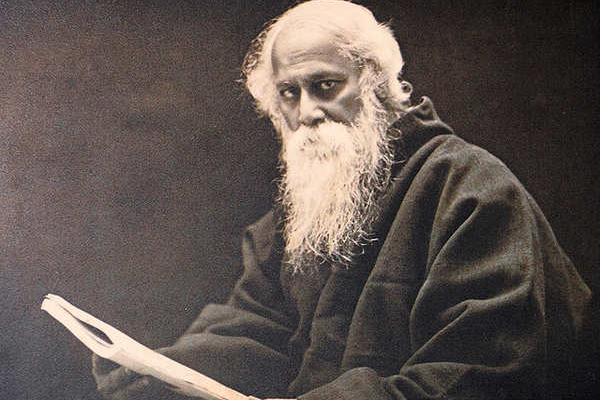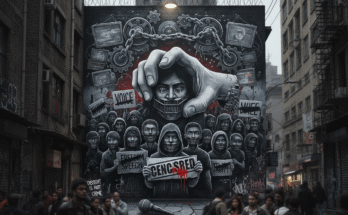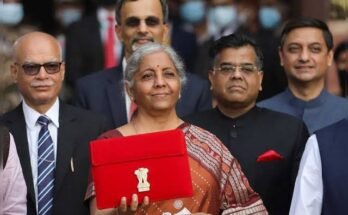On the 25th day of Bangla Boishakh every year, India celebrates Rabindranath Tagore’s birthday with full enthusiasm. He was born on the 7th day of May 1861 in the renowned family of undivided Bengal at Jorasanko, Calcutta (Now Kolkata). He was a stalwart better say statesman who was conferred Gurudev (The luminous teacher) by Mohandas Karamchand Gandhi @ Mahatma Gandhi. Once upon a time, Mahatma Gandhi used to lean towards Nationalism and Jawaharlal Nehru considered India as the land of the Crescent Moon. Both of them, even the Congress party, acceded to Nationalism in religious coupled with cultural form. Raghupati Raghav Raja Ram, Patit Pawan Sita Ram played an instrumental role. Mohandas Karamchand Gandhi deliberated nationalism on higher pedestal and Rabindranath Tagore cogitated humanity prevails above all. Nonetheless both of them respected each other but this was not the end.
With quintessentially laureate precision, he wrote his famous essay, “The Cult of the Charkha” wherein Gurudev Rabindranath Tagore criticized both of them, “As is livelihood for the individual, so is politics for a particular people- a field for the exercise of their business instincts of patriotism. All this time, just as business has implied antagonism, so has politics been concerned with the self-interest of a pugnacious Nationalism.”
Both Gandhi and Nehru approbated secularism as recrudescence and accepted his definition of nation (which is supposed to be the closest in the spirit of the word and aptly defined), “A Nation is that aspect which a whole population assumes when organized for a mechanical purpose”. And thus, according to him “nationalism is a cruel epidemic of evil that is sweeping over the human world of the present age.”
When Raja Ram Mohan Roy used arguments to improve the situation of Indian women during the British Raj when low levels of female literacy, practices of sati, child marriage designated to the urgent need for social reform, it is his (Tagore’s) father who extended his support and founded Brahmo Samaj with Roy and surprised the world by uplifting the status of women in India. The same spirit accorded Rabindranath Tagore.
Tagore heard the cry of fear, of weakness as well as of dwarf and composed famous and encouraging poetry, “Open thy mind, walk alone. Be not afraid, walk alone” (যদি তোর ডাক শুনে কেউ না আসে তবে একলা চলো রে). Being a follower of Brahmo Samaj, he believed in monism. He believed that in India, “He who truly loves God receives such homage from men as would be considered almost sacrilegious in the west. We see in him God’s wish fulfilled, the most difficult of all obstacles to his revealment removed, and God’s own perfect joy fully blossoming in humanity.” According to him, we are not animals merely because of knowledge. He believed that animals must have knowledge that can be employed for useful purposes of its life. We are humans because we could assert that knowledge in us for the sake of knowledge i.e. according to him we must strive for gaining more and more knowledge; an idea of ‘Art for Art’s sake’.
He was a lover of art. He was of the opinion that empathy and compassion distinguishes humans from animals. Animals have expressions only to the extent of its usefulness; rather for humans it is boundless which spreads ‘their branches far and wide in the infinite sky high above their soil.’ “In these large tracts of nebulousness Art is creating its stars- stars that are definite in their form but infinite in their personality. Art is calling us the ‘children of the immortal’, and proclaiming our right to dwell in the heavenly worlds.” He emphasized on building personality and characters- personality by art and character by knowledge.
For women, he was surprisingly straightforward when he said, “When male creatures indulge in their fighting propensity to kill one another Nature connives at it, because comparatively speaking, females are needful to her purpose, while males are barely necessary. Being of an economic disposition she does not specially care for the hungry broods who are quarrelsomely voracious and who yet contribute very little towards the payment of Nature’s bill. Therefore in the insect world we witness the phenomenon of the females taking it upon themselves to keep down the male population to the bare limit of necessity.”
When one visits any part of Bengal, one will hear that ‘the ideal of stability (moral rhythm, balance of power, harmony of structure with its foundation) is deeply cherished in women’s nature.’ This sense was germinated by Gurudev. In 1923 he started Basanta Utsav in Bengal just to bring equity. In this festival, men and women get themselves adored by ‘yellow-coloured or pure white clothes and wear garlands of fragrant flowers. They sing and dance to the accompaniment of musical instruments like ektara, dubri, veena, etc.’ and sing Rabindra Sangeet, “Dear householder, open thy door, Holi touches us. Holi touches on the land, in the water, in the forest, open thy door, open thy door” (ওরে গৃহবাসী, খোল দ্বার খোল, লাগল যে দোল। স্থলে জলে বনতলে লাগল যে দোল, দ্বার খোল, দ্বার খোল).
On relationship, he was of the view that a relationship of pure utility ignores the rights and needs of one’s deeper nature thereby invites no feeling of compunction in maltreating and killing things of beauty which cannot ever be restored. He admitted that selfishness has the largest chunk in the government and trade in the history of humankind, yet the people struggled to maintain the balance of forces in society. He arraigned science for making the possibilities of profit immoderate in the history of money before which the entire universe was kneeling down at the time of colonialism. He believed in the power of self-control and self-dedication which are no doubt truer subjects for the exultation of humans otherwise society always suffers from material poverty.
According to him, “When we accept any discipline for ourselves, we try to avoid everything except that which is necessary for our purpose; it is this purposefulness, which belongs to the adult mind, that we force upon school children. He somewhere says, “You cannot cross the sea merely by standing and staring at the water.” He was one of the leading critics of foreign education that tends to occupy all the space of our national mind by killing the great opportunity for the creation of a new thought power. He famously said, “The highest education is that which does not merely give us information but that makes our life in harmony with all existence”: according to him the same is missing in foreign education.
Liang Chi Chao, the then President of Universities Association, Peking said that Rabindranath Tagore comes to China from the country which is its nearest and dearest brother – India. To his words, “In the personality of Rabindranath Tagore, as well as in his poetry, we find that exemplification of those principles of absolute love and absolute freedom, which form the basis of Hindu culture and civilization. … I am perfectly sure that Rabindranath Tagore is as important to us as Asvaghosha who wrote the life of Buddha in ancient days, and we hope the influence he is going to exert on China will not in any way be inferior to that of Kumarajiva and Chang Ti.”
Writing on Rabindranath Tagore is akin to explain the obvious, to advise a wise. His works are compiled in more than 2000 pages. He is the first Indian who received the prestigious Nobel prize in literature. We must remember and act on what he said , “I slept and dreamt that life was a joy. I awoke and saw that life was service. I acted and behold, service was a joy” failing which we will be cursed by ourselves. His two verses became national anthem of two countries: Jana-Gana-Mana became the national anthem of India and Amar Sonar Bangla became the national anthem of Bangladesh. During his last days, his philosophy carried sorrows of the ages which should be addressed by us taking initiatives to let the helpless supplied with at least the minimum requirements lest we forget him.




